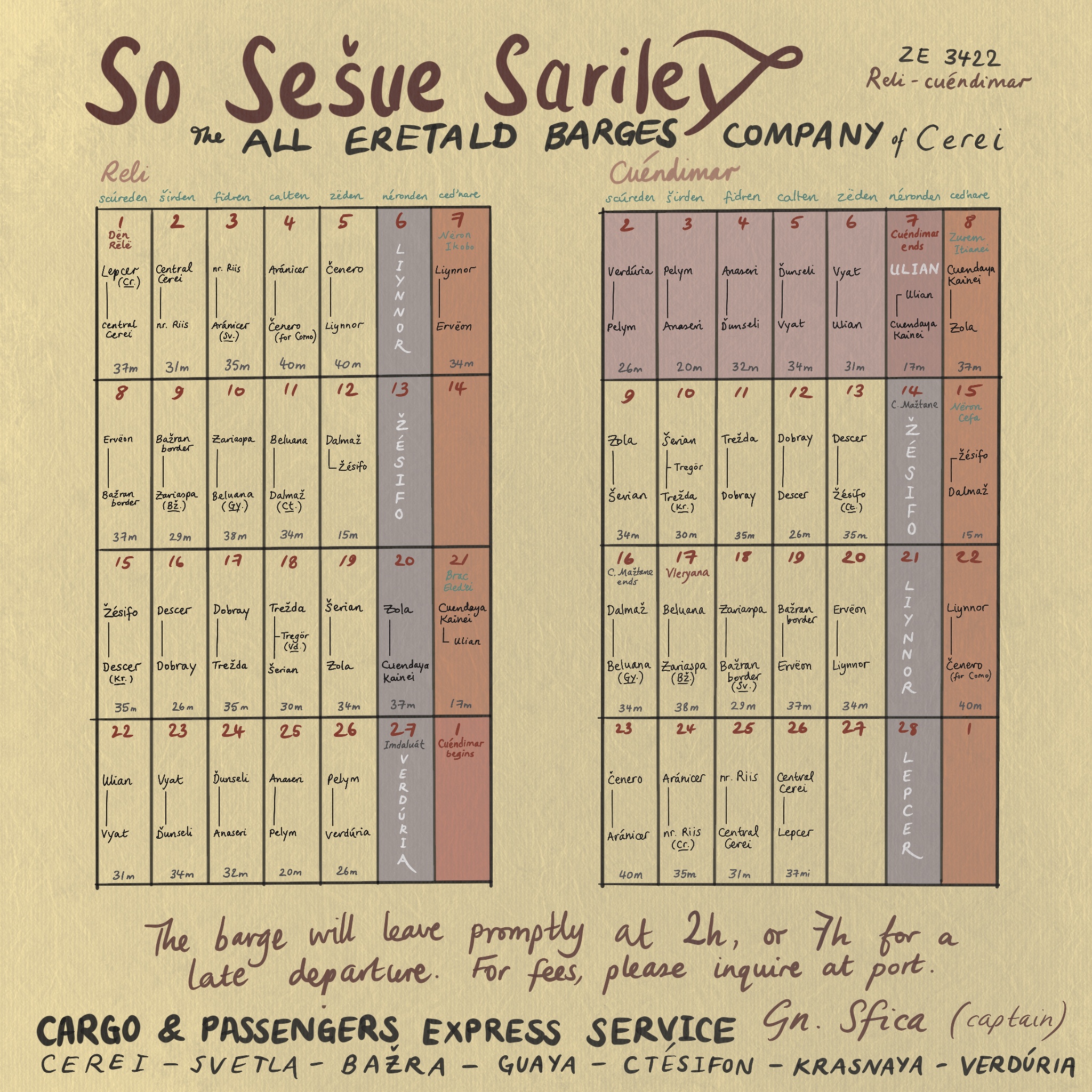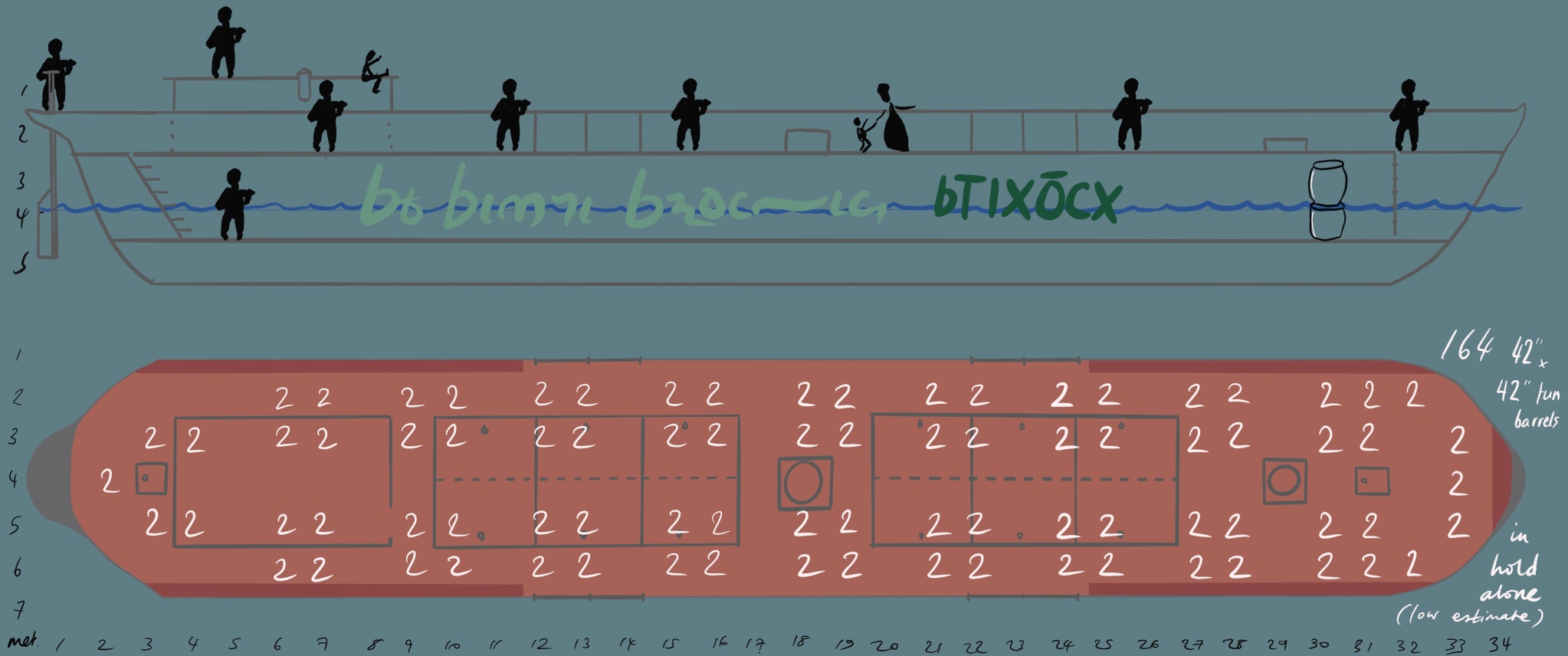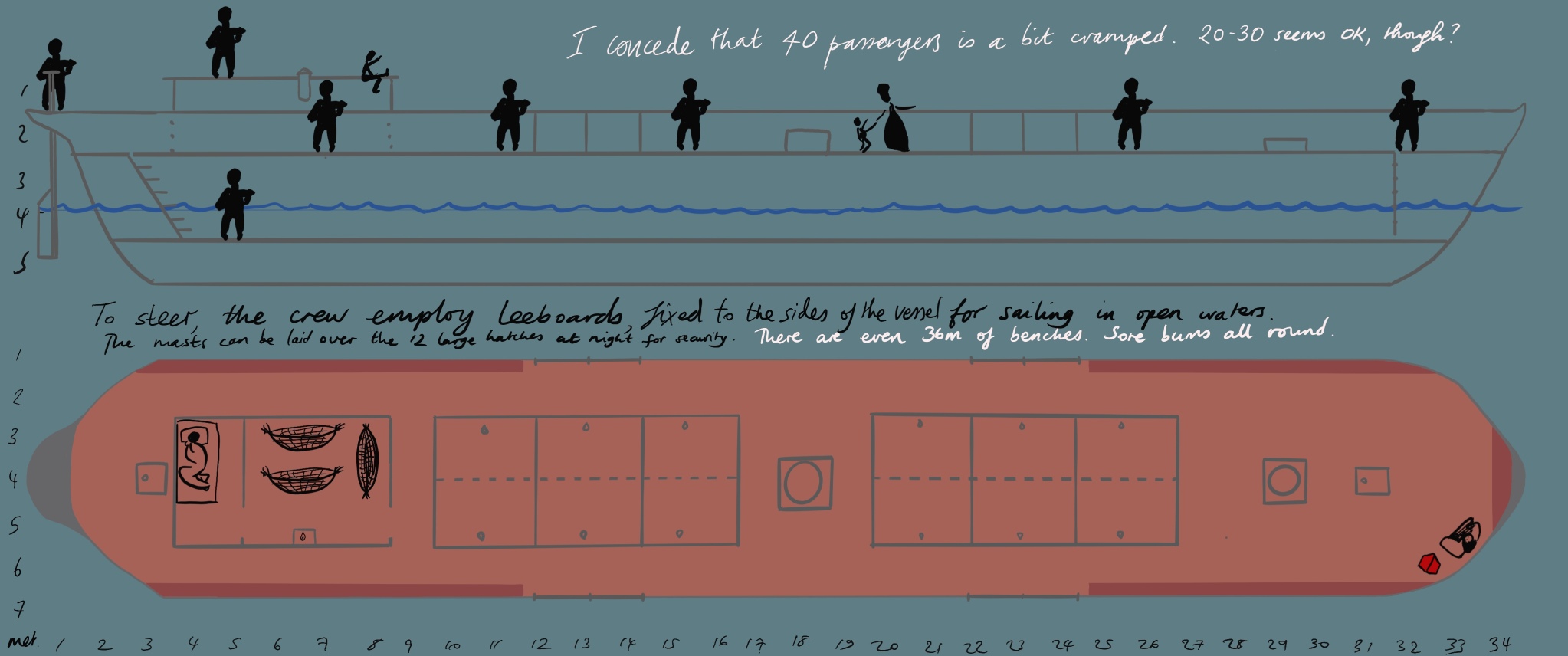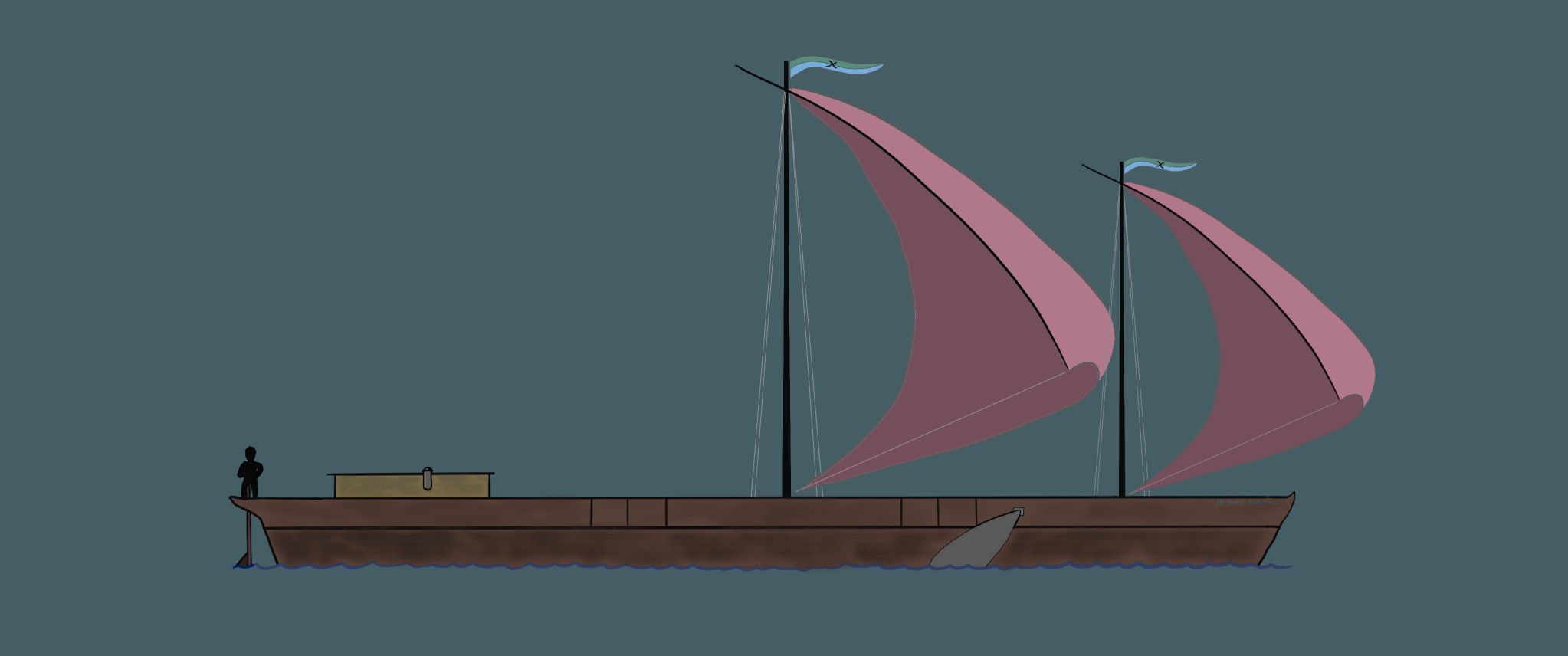Thanks, hwhatting, I'm grateful for your input.
I'm going to offer some remarks; I didn't want to get maybe
quite as deep into this as I have, really, and what happens on Almea is for zomp to decide. But one thing I'm taking (respectful) issue with is the idea that 'it will be the same way it is on (some bit of) Earth (that I know well)'. Why do we conworld, if not to ask how
else might things work, given specific parameters? If zomp had taken the former approach, there would only be one Thinking Kind on Almea, and it would just be a clone of Earth. Etc. I'm sure we all have our examples from our own conworlds.
Also, using historical models is only particularly useful if we can check the various different models that are available to see if our findings are general, on which I take issue with your first point:
hwhatting wrote: ↑Thu Feb 01, 2024 5:16 am
Stage coaches had schedules earlier, because they were specific:
- They were part of royal / imperial postal systems; that was their original purpose, taking passengers along was a nice earner on top. Government mail was expected to be delivered fast and on a schedule; private mail tagged along - again, to make money to cover the cost of the government service. While the services carried official mail, they were often outsourced to private operators (e.g. to the Thurn und Taxis family in the Holy Roman Empire).
This information may stand for the Holy Roman Empire - I don't know - but it is incorrect for the history of the stagecoach in Britain. The British Post Office consisted of riders on horseback from its inception in 1635 for 150 years, until John Palmer made the suggestion to swap to stagecoach in 1782 and created the Royal Mail. Stagecoaches for passengers were first recorded in 1610 (the first route was from Edinburgh to Leith, but by mid-century there was a growing nationwide network).
In part, I think this underlines that there isn't just one way for a society's transport infrastructure to develop into the industrial era. Just because in the Holy Roman Empire in the 17th-18th centuries, the post provided a specific context for transport schedules to appear, it is not the case that other factors in other times/climes(/universes!) might not also provide a specific context for similar development of other kinds of transport schedules.
- They had their own infrastructure - specific inns on the routes, where horses would be exchanged, fed, and cared for. That allowed them to be (relatively) fast and keep to the schedule. (The postal roads were also meant to be maintained to allow higher speed, but that was often more theory than fact.)
Sure - and why can't river travel have its own infrastructure, too, if the conditions are right? Specific inns on the routes, animals to hire for hauling, etc. Eretald has made extensive use of riverboats for millennia (in common with other alluvial agricultural cultural areas on Almea*). A riverboat design with a continuous tradition going back to classical times is still stamped on Verdurian coins. We might think, for a second, how much riverboat infrastructure development is represented by the year designation 'ZE 3480'. We might, too, look at the map of Almea: every large nation we know much about until 3480 exists on its major river system; arguably, except Šura, though of course it has its rivers too, though it's more littoral-orientated. (I'm not counting Kebri as large, but even then, its small rivers are important to it: they are quick to copy Verduria in establishing a steamboat service between Kebropol and Laaven, a little upriver.) If the most advanced areas of Almea don't have any specific river transport infrastructure by the early industrial era, I'll be pretty surprised!
Let's also think about the specific rivers in question for a moment. They're rather large. If zomp would be happy to share it here (it was recently put on the Patreon), there's a comparative map of Europe and Ereláe which is useful to consider here. The Svetla, the Eärdur and the Meuna are
enormous rivers, each comparable to the Volga (and those three all drain in the same channel, at whose mouth sits Verdúria city). If you have this great whacking thing slap bang in the middle of your territory, it
is your infrastructure.
- They wouldn't carry large cargo, only mail and parcels sent by post, plus the (limited) baggage of the travellers.
Sure, stagecoaches are small (though the Franco-Iberian
Diligence /
Diligencia was a bit larger and held a specific luggage deck, but still, nothing like a barge!).
So if you want something like that, you need to imagine a service of fast passenger boats that maybe takes mail along, not a cargo ship that lets passengers hop on.
I don't follow: there can't be cargo ships that let passengers hop on, because stagecoaches didn't carry large cargo?
(And I doubt correspondence in Eretald generally goes by boat, unless it is not very urgent. A rider can carry a fair amount of letters, and can go anywhere, and is usually going to be faster. Zomp, not sure if you've written yet about the Verdurian postal service? Though I note that
it has one.)
Even in our times, cargo ships still frequently wait in ports until they have filled up with cargo for the next leg of the journey*); that would have been the default modus operandi in premodern times.
*) Which, due to containers and modern communications is much faster nowadays than it used to be; an acquaintance of my brother who is a sailor told us that they don't see much of foreign ports because the turnaround times (unloading, finding the next cargo, loading it) have come down to a couple of hours. Before containers and big cranes, loading and unloading could take days; before the telephone and the telegraph, finding the next cargo (or finding out that fitting cargo was waiting in a neigbouring port) could take weeks.
This definitely gave me food for thought, for which I'm grateful!
Again, though, let me take this back to the specific parameters this has grown in:
Why would a company want to run a barge service from the relative backwater of Lepcer 1000km to Verdúria, rather than just buy things from their neighbours?
- They want specific quality goods that are not found in nearer ports. (Check)
- They have specific goods that are not provided to Verdúria by nearer ports. (Check - cf the Xazengri trade)
- It's physically possible to do it and come back alive. (Check, if you have the right kinds of boats.)
- You can make a profit doing so. (I don't know as it's a very complex/unanswerable question when Almea is a text-based simulation that by its nature lacks deep/complex economic models for us to actually test, but taking on day-passengers is only going to help with this.)
The cargo is probably mostly intended for each end-to-end destination. If you can't sell it in Verdúria city, you probably won't be able to sell it anywhere... It has one of the biggest markets in the world, and I imagine there are plenty of wholesalers ready to buy up cargo that isn't specifically spoken for around the city. You have contacts, correspondence, and
three months between visits to the city to work out what you're going to buy.
If you leave Lepcer without a full cargo, that's no biggie. You have a month to buy some interesting stuff to sell along the way. You can also take on passengers instead: at least on certain sections of the river, there are hundreds of pilgrims seeking passage every day, and that's just the pilgrims. Hey, why don't you take on a few passengers anyway? They're willing to part with money just to sit on top of your deck, on your cargo if necessary, with literally nothing that you have to do to look after them.
With the cargo, it's the same story for the way back: if you don't buy a full shipsworth of stuff in Verduria over the few days you're there, you will have between 30 and 50 more days to try to buy piecemeal from ports along the way. And again there are the people who are willing to just sit on your ship with no input in all weathers, simply because they need a way to get from A-B; you can take as many or as few as you like or as feels convenient for you and your crew -- just like Stagecoach owners allowed people to sit on the top of the Stagecoaches for a reduced price.
____
I hope in all I'm managing to persuade you that your arguments, while interesting, do not preclude the development of alternative models given alternative parameters. On what actually happens in Almea, of course I defer to Zompist. Thank you for an interesting discussion!
____
*Almea seems big on enormous river systems, and Almean Thinking Kinds on living on them. Why? I don't know -- a few potential factors: it's warmer than here; its geological history is quite different (no evidence of ice ages); I'm no expert in tectonics but it seems in a splitting apart phase rather more than a smashing together phase, so it has lots of these massive plains; and of course its sentient beings come from and remain particularly at home in the water...



